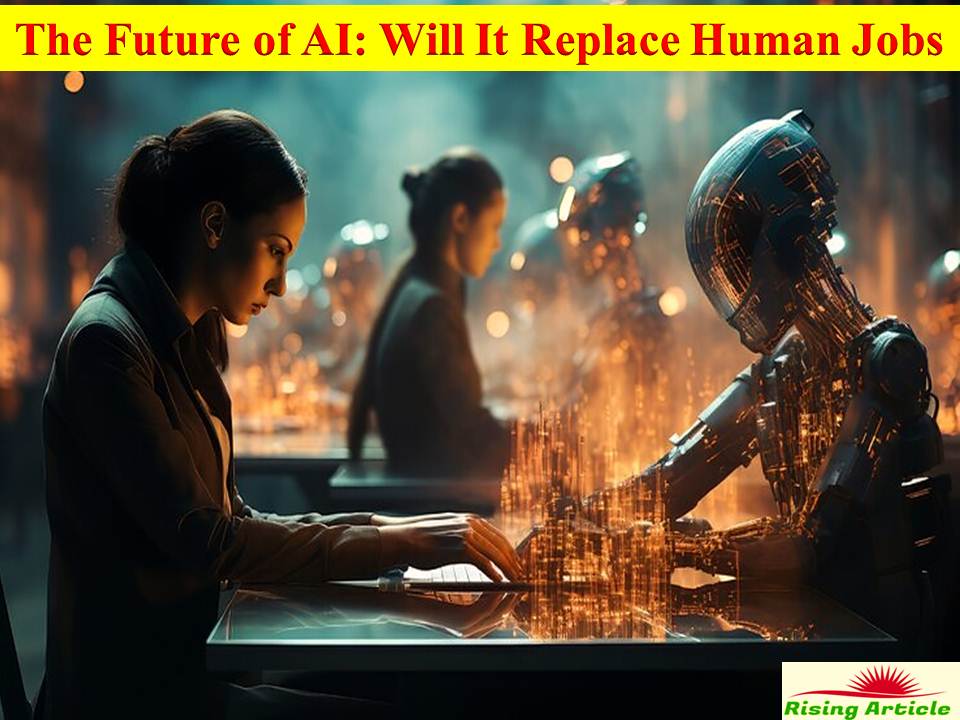The Impact of AI on Jobs in 2025 🚀💡
As we look toward 2025, artificial intelligence (AI) is set to play an increasingly significant role in shaping the future of work. From manufacturing plants to healthcare systems, AI is disrupting traditional industries and transforming the workforce. But with the rapid rise of automation, many are left wondering: Will AI replace human jobs, or will it enhance human capabilities and create new opportunities? 🤔
In this article, we’ll examine how AI is currently affecting jobs, which sectors are most vulnerable to automation, and how AI will shape the future of employment, especially in the USA. With the right approach, we can ensure that AI becomes a complement to human skills, rather than a threat to employment. 🌱
 AI in the Workforce: A Dual Impact 🤖📈
AI in the Workforce: A Dual Impact 🤖📈
AI has the potential to both replace and augment human roles, depending on the nature of the tasks being performed. While some industries will experience job displacement due to automation, others will see new opportunities emerge. AI technology is particularly effective at handling repetitive, routine tasks, but humans remain irreplaceable in roles that require empathy, creativity, and complex problem-solving.
How AI is Automating Jobs:
- Manufacturing 🏭: AI-powered robots are increasingly being used to automate tasks on assembly lines, resulting in more efficient production processes. While factory jobs may decrease, there will be a rising demand for robotic technicians, AI engineers, and automation specialists to maintain and oversee AI-driven machinery.
- Customer Service 📞: AI is changing how businesses handle customer support. AI chatbots and virtual assistants are already performing tasks such as answering frequently asked questions, providing basic troubleshooting, and offering product recommendations. While this may reduce the need for customer service representatives in certain areas, human agents will still be required to handle complex issues and provide personalized assistance.
- Transportation 🚗: The rise of autonomous vehicles is one of the most talked-about applications of AI in the transportation sector. Self-driving trucks, cars, and delivery drones are expected to replace millions of driving jobs. However, new job roles, including autonomous vehicle technicians, AI safety managers, and data analysts for autonomous systems, will emerge.
While certain jobs will be displaced by automation, AI can also work alongside human workers, improving efficiency and allowing them to focus on more complex and creative tasks. 🌟
The Jobs at Risk: Which Roles Are Most Vulnerable to AI? 📉
AI’s ability to perform tasks faster and more efficiently than humans means certain jobs will be at higher risk of being replaced by automation. These roles often involve repetitive tasks that don’t require complex decision-making or human interaction.
Industries Most Affected by AI Automation:
- Manufacturing 🏭: Assembly lines, packing, and quality control are increasingly automated, leaving factory workers at risk of job loss. However, the demand for jobs related to robotics maintenance, AI system management, and automation specialists will rise.
- Retail 🛍️: Self-checkout systems, automated inventory management, and AI-driven customer service are transforming retail jobs. Cashiers and stock clerks may see a decline in employment opportunities as these tasks become automated.
- Data Entry and Administrative Roles 🖥️: Jobs that require repetitive tasks such as data entry, scheduling, and basic report generation will be increasingly handled by AI systems, which can process data more efficiently than humans.
Despite this, workers in vulnerable roles can reskill and transition into more complex and AI-enhanced positions that require human expertise. 💡
AI and the Creation of New Jobs: Opportunities in the AI Era 🚀
While AI automation might eliminate certain roles, it will also create new opportunities that didn’t exist before. Many of these new jobs will require a blend of human skills and AI expertise, ensuring that workers continue to thrive in an AI-powered world.
Emerging Jobs in the AI Economy:
- AI Engineers and Data Scientists 👩💻: As demand for AI technologies increases, so will the need for AI engineers, data scientists, and machine learning specialists. These professionals will be responsible for developing, training, and maintaining AI systems across industries.
- AI Trainers 🧑🏫: AI systems require training to ensure they perform optimally. AI trainers will play a crucial role in providing machines with the right data sets and feedback to improve performance and enhance decision-making.
- AI Ethics Professionals ⚖️: As AI becomes more integrated into society, ethical concerns regarding privacy, data security, and bias will require the expertise of AI ethics specialists. These professionals will ensure AI systems are developed in an ethical, fair, and transparent manner.
- Human-AI Collaboration Specialists 🤝: As AI systems are introduced into businesses, roles that bridge the gap between AI systems and human workers will emerge. AI integration managers will ensure AI technologies are used to enhance human productivity and create a more collaborative working environment.
AI and Skills for the Future: Preparing for the AI Workforce 🔧💡
To thrive in the AI-driven job market, workers will need to reskill and develop new skills that complement AI’s capabilities. The future workforce will require a combination of technical skills, creativity, and emotional intelligence.
Key Skills for the AI Era:
- Technical Skills 💻: Professions that involve programming, machine learning, and data analysis will be in high demand. Workers with expertise in AI-related fields will be well-positioned for success.
- Creative Thinking 🎨: AI cannot replace human creativity. Professions that require problem-solving, innovation, and artistic expression will continue to thrive in the AI age.
- Emotional Intelligence 💖: AI cannot replicate human empathy, which is why professions in healthcare, education, and customer service will continue to rely on human workers for their emotional connection with others.
By developing these skills, workers can ensure they are future-ready in an AI-driven world. 🌱
AI in the USA: A Nation Adapting to Automation 🇺🇸
The USA is a global leader in AI innovation, with tech giants like Google, Microsoft, and Amazon leading the way in AI development. As AI technologies continue to evolve, they will have a profound impact on the U.S. job market.
Impact of AI on the U.S. Job Market:
- Job Creation 💼: As AI reshapes industries like healthcare, education, and technology, new jobs will emerge that require human oversight, collaboration, and creativity.
- Job Displacement 📉: Certain sectors, particularly manufacturing and transportation, may experience significant job displacement due to automation.
- Reskilling 🔑: With the rise of AI, it’s crucial for workers to reskill through training programs and online courses to remain competitive in the workforce.
As AI continues to develop, the U.S. workforce will need to adapt and embrace new technologies to thrive in the future economy. 🚀
The Future of Work: What Does the Data Say? 📊
To understand how AI is transforming the workforce, here’s a chart that breaks down AI’s impact on job sectors over the next few years:
| Industry | Impact of AI | Job Creation | Job Displacement |
| Manufacturing | Automation of production lines and tasks | Robotic tech jobs | Factory floor jobs |
| Customer Service | AI-driven chatbots and support systems | AI chatbot management | Call center agents |
| Healthcare | AI in diagnostics and treatment planning | AI health assistants | Admin support roles |
| Transportation | Self-driving vehicles and drones | Autonomous vehicle tech | Driving jobs |
| Retail | AI in inventory management and checkout | AI-powered retail assistants | Cashiers and stock clerks |
Conclusion: Embracing AI as a Partner, Not a Rival 🌟
In conclusion, AI is not a replacement for human jobs, but rather a tool that can augment human capabilities and create new opportunities. While some jobs will be automated, many more will emerge that require creativity, critical thinking, and emotional intelligence—areas where humans excel and AI cannot replace.
By embracing AI, workers can enhance their skills, collaborate with technology, and lead the way into the future of work. The key is to focus on reskilling, adapting to AI technologies, and embracing the future of work with optimism. 🌍🚀




